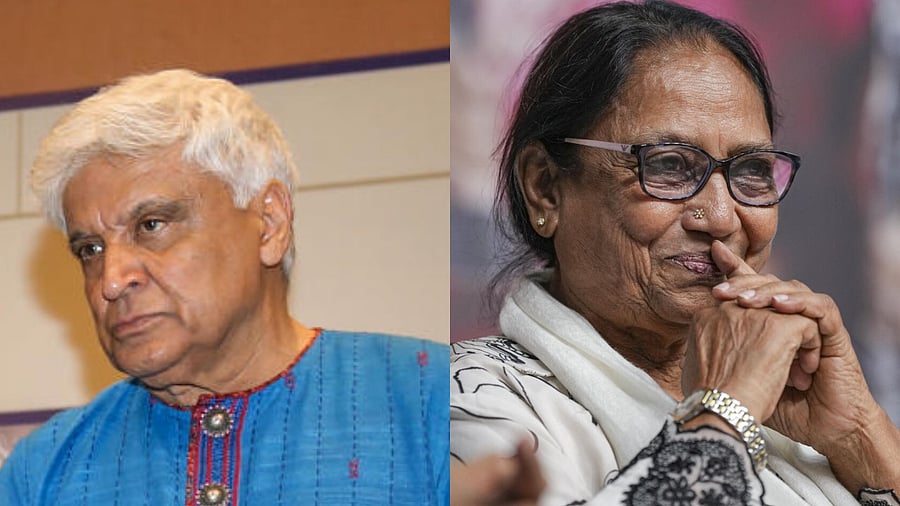
Javed Akhtar and Banu Mushtaq in a frame.
Credit- PTI Photo
Banu Mushtaq and Javed Akhtar’s cases remind us that writers are not property, and ideas are not borders.
Akhtar’s Mushaira in Kolkata was indefinitely postponed after protests over past remarks, while Mushtaq is facing backlash surrounding the inauguration of the Mysuru Dasara festival. These incidents reveal the imaginative and intellectual limits of those who seek to cage thought in the name of offense.
Writers, by vocation, are creatures of universality. Born into a faith or culture, their reach defies parochial boundaries. Kabir critiqued Hindu orthodoxy despite being Muslim. Rumi’s Sufi verses traverse faiths, reaching secular readers worldwide. Rabindranath Tagore and Salman Rushdie draw from multiple cultural and linguistic influences, creating palimpsests of meaning whose ownership is collective, not sectarian.
Just as no tongue can claim exclusive possession of language, no religion can claim dominion over a writer’s imagination, and ‘religion itself does not belong to any religious authority’. Language is a tool, not a jailer.
Akhtar writes in Urdu and Hindi, Rushdie uses Hindi and Urdu to localise his stories, and Tagore translated Bengali works into English. Once released, narratives are no longer private property; they become a commonwealth of humanity. This universality is ethical, political, and empathetic.
Writers probe love, grief, justice, and hope in ways unbound by creed. Festivals, too, are cultural, not religious. Mushtaq’s inclusion in Dasara affirmed that a cultural space, like literature, is inherently inclusive. Attempts to fence it in reveal fear and the shallowness of those policing ideas.
The problem becomes tangible when refusing a particular set of beliefs is treated as a test of loyalty, resulting in outright rejection by those who expect total obedience. Writers exercise the freedom to choose which ideas, traditions, or practices to embrace.
Participation in traditions outside one’s own culture can be labelled as betrayal, as if the offended had the authority to decide who belongs or who is disqualified. Reducing creative work to a compliance test ignores the deliberate choices that define a writer’s vocation, as well as the universality, hybridity, and imaginative freedom inherent in literature.
Offense often reflects the censor, not the writer. Those claiming grievance indict themselves: their narrow worldview mirrors their limitations. Ego frequently drives communal censorship. If a writer offends a particular individual or challenges entrenched authority, reactions are less about ideas and more about protecting fragile egos and preserving hierarchy. Literature is meant to expand sensibilities, not mollify them.
Communalism intensifies this policing, and women writers are disproportionately targeted by men claiming moral authority. If a woman questions dogma, critiques power, or offends a man’s ego, communal forces rush to cancel her, blocking appearances or amplifying outrage. Arundhati Roy and many other South Asian women writers have faced criticism, legal intimidation, and threats for their outspoken critiques of State policy and communal politics. Such censorship exposes insecurity, not authority.
Writers may borrow from tradition or practice a religion, yet they are never its captives. They can belong to a culture, language, or faith while transcending beyond it at the same time, they can choose any focus, but once released, their work transcends intention. Their reception is collective, and their literature cannot be monopolised.
A verse written for one god can resonate with the believer of another, or even with an atheist seeking meaning beyond religion. Attempting to confine such voices exposes the smallness of the worldview doing the confining. This multiplicity enriches identity rather than erasing it. Hybridity is central to the literary experience: their work inhabits both particularity and universality, speaking to human nuances without being constrained by doctrine or language.
Literary freedom is inherently transnational and trans-religious. Allegiance lies with human imagination, moral insight, and empathy, and not institutions or ideologies. Attempts to confine writers reveal not their deficiency, but the censor’s fear of plurality. Rushdie, Akhtar, Roy, and countless others have endured censorship, yet banning amplifies their reach. Ideas, language, and narrative travel freely. No edict or outrage can contain them.
Controversies surrounding Akhtar and Mushtaq reaffirm an enduring truth: writers are not property to be guarded or territories to be defended. Their dominion is over human thought and feeling. Offense is never a boundary, but a mirror reflecting the narrowness of those who impose it.
Societies that strive to cage writers expose their own confinement. Writers are uncontainable. Their realm is the shared human imagination, where words, ideas, and emotions flow freely, indifferent to borders, dogmas, or boundaries.
(Pragya Akhilesh Crosdil is a trade unionist)